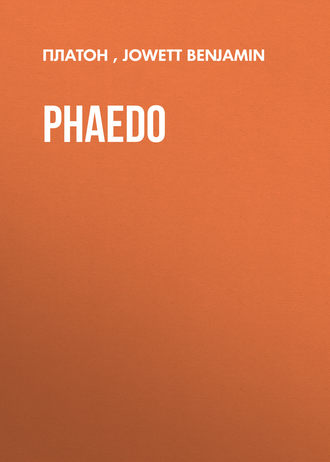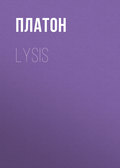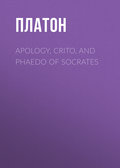
Платон
Phaedo
16. Yet after all the belief in the individuality of the soul after death had but a feeble hold on the Greek mind. Like the personality of God, the personality of man in a future state was not inseparably bound up with the reality of his existence. For the distinction between the personal and impersonal, and also between the divine and human, was far less marked to the Greek than to ourselves. And as Plato readily passes from the notion of the good to that of God, he also passes almost imperceptibly to himself and his reader from the future life of the individual soul to the eternal being of the absolute soul. There has been a clearer statement and a clearer denial of the belief in modern times than is found in early Greek philosophy, and hence the comparative silence on the whole subject which is often remarked in ancient writers, and particularly in Aristotle. For Plato and Aristotle are not further removed in their teaching about the immortality of the soul than they are in their theory of knowledge.
17. Living in an age when logic was beginning to mould human thought, Plato naturally cast his belief in immortality into a logical form. And when we consider how much the doctrine of ideas was also one of words, it is not surprising that he should have fallen into verbal fallacies: early logic is always mistaking the truth of the form for the truth of the matter. It is easy to see that the alternation of opposites is not the same as the generation of them out of each other; and that the generation of them out of each other, which is the first argument in the Phaedo, is at variance with their mutual exclusion of each other, whether in themselves or in us, which is the last. For even if we admit the distinction which he draws between the opposites and the things which have the opposites, still individuals fall under the latter class; and we have to pass out of the region of human hopes and fears to a conception of an abstract soul which is the impersonation of the ideas. Such a conception, which in Plato himself is but half expressed, is unmeaning to us, and relative only to a particular stage in the history of thought. The doctrine of reminiscence is also a fragment of a former world, which has no place in the philosophy of modern times. But Plato had the wonders of psychology just opening to him, and he had not the explanation of them which is supplied by the analysis of language and the history of the human mind. The question, 'Whence come our abstract ideas?' he could only answer by an imaginary hypothesis. Nor is it difficult to see that his crowning argument is purely verbal, and is but the expression of an instinctive confidence put into a logical form: – 'The soul is immortal because it contains a principle of imperishableness.' Nor does he himself seem at all to be aware that nothing is added to human knowledge by his 'safe and simple answer,' that beauty is the cause of the beautiful; and that he is merely reasserting the Eleatic being 'divided by the Pythagorean numbers,' against the Heracleitean doctrine of perpetual generation. The answer to the 'very serious question' of generation and destruction is really the denial of them. For this he would substitute, as in the Republic, a system of ideas, tested, not by experience, but by their consequences, and not explained by actual causes, but by a higher, that is, a more general notion. Consistency with themselves is the only test which is to be applied to them. (Republic, and Phaedo.)
18. To deal fairly with such arguments, they should be translated as far as possible into their modern equivalents. 'If the ideas of men are eternal, their souls are eternal, and if not the ideas, then not the souls.' Such an argument stands nearly in the same relation to Plato and his age, as the argument from the existence of God to immortality among ourselves. 'If God exists, then the soul exists after death; and if there is no God, there is no existence of the soul after death.' For the ideas are to his mind the reality, the truth, the principle of permanence, as well as of intelligence and order in the world. When Simmias and Cebes say that they are more strongly persuaded of the existence of ideas than they are of the immortality of the soul, they represent fairly enough the order of thought in Greek philosophy. And we might say in the same way that we are more certain of the existence of God than we are of the immortality of the soul, and are led by the belief in the one to a belief in the other. The parallel, as Socrates would say, is not perfect, but agrees in as far as the mind in either case is regarded as dependent on something above and beyond herself. The analogy may even be pressed a step further: 'We are more certain of our ideas of truth and right than we are of the existence of God, and are led on in the order of thought from one to the other.' Or more correctly: 'The existence of right and truth is the existence of God, and can never for a moment be separated from Him.'
19. The main argument of the Phaedo is derived from the existence of eternal ideas of which the soul is a partaker; the other argument of the alternation of opposites is replaced by this. And there have not been wanting philosophers of the idealist school who have imagined that the doctrine of the immortality of the soul is a theory of knowledge, and that in what has preceded Plato is accommodating himself to the popular belief. Such a view can only be elicited from the Phaedo by what may be termed the transcendental method of interpretation, and is obviously inconsistent with the Gorgias and the Republic. Those who maintain it are immediately compelled to renounce the shadow which they have grasped, as a play of words only. But the truth is, that Plato in his argument for the immortality of the soul has collected many elements of proof or persuasion, ethical and mythological as well as dialectical, which are not easily to be reconciled with one another; and he is as much in earnest about his doctrine of retribution, which is repeated in all his more ethical writings, as about his theory of knowledge. And while we may fairly translate the dialectical into the language of Hegel, and the religious and mythological into the language of Dante or Bunyan, the ethical speaks to us still in the same voice, and appeals to a common feeling.
20. Two arguments of this ethical character occur in the Phaedo. The first may be described as the aspiration of the soul after another state of being. Like the Oriental or Christian mystic, the philosopher is seeking to withdraw from impurities of sense, to leave the world and the things of the world, and to find his higher self. Plato recognizes in these aspirations the foretaste of immortality; as Butler and Addison in modern times have argued, the one from the moral tendencies of mankind, the other from the progress of the soul towards perfection. In using this argument Plato has certainly confused the soul which has left the body, with the soul of the good and wise. (Compare Republic.) Such a confusion was natural, and arose partly out of the antithesis of soul and body. The soul in her own essence, and the soul 'clothed upon' with virtues and graces, were easily interchanged with one another, because on a subject which passes expression the distinctions of language can hardly be maintained.
21. The ethical proof of the immortality of the soul is derived from the necessity of retribution. The wicked would be too well off if their evil deeds came to an end. It is not to be supposed that an Ardiaeus, an Archelaus, an Ismenias could ever have suffered the penalty of their crimes in this world. The manner in which this retribution is accomplished Plato represents under the figures of mythology. Doubtless he felt that it was easier to improve than to invent, and that in religion especially the traditional form was required in order to give verisimilitude to the myth. The myth too is far more probable to that age than to ours, and may fairly be regarded as 'one guess among many' about the nature of the earth, which he cleverly supports by the indications of geology. Not that he insists on the absolute truth of his own particular notions: 'no man of sense will be confident in such matters; but he will be confident that something of the kind is true.' As in other passages (Gorg., Tim., compare Crito), he wins belief for his fictions by the moderation of his statements; he does not, like Dante or Swedenborg, allow himself to be deceived by his own creations.
The Dialogue must be read in the light of the situation. And first of all we are struck by the calmness of the scene. Like the spectators at the time, we cannot pity Socrates; his mien and his language are so noble and fearless. He is the same that he ever was, but milder and gentler, and he has in no degree lost his interest in dialectics; he will not forego the delight of an argument in compliance with the jailer's intimation that he should not heat himself with talking. At such a time he naturally expresses the hope of his life, that he has been a true mystic and not a mere retainer or wand-bearer: and he refers to passages of his personal history. To his old enemies the Comic poets, and to the proceedings on the trial, he alludes playfully; but he vividly remembers the disappointment which he felt in reading the books of Anaxagoras. The return of Xanthippe and his children indicates that the philosopher is not 'made of oak or rock.' Some other traits of his character may be noted; for example, the courteous manner in which he inclines his head to the last objector, or the ironical touch, 'Me already, as the tragic poet would say, the voice of fate calls;' or the depreciation of the arguments with which 'he comforted himself and them;' or his fear of 'misology;' or his references to Homer; or the playful smile with which he 'talks like a book' about greater and less; or the allusion to the possibility of finding another teacher among barbarous races (compare Polit.); or the mysterious reference to another science (mathematics?) of generation and destruction for which he is vainly feeling. There is no change in him; only now he is invested with a sort of sacred character, as the prophet or priest of Apollo the God of the festival, in whose honour he first of all composes a hymn, and then like the swan pours forth his dying lay. Perhaps the extreme elevation of Socrates above his own situation, and the ordinary interests of life (compare his jeu d'esprit about his burial, in which for a moment he puts on the 'Silenus mask'), create in the mind of the reader an impression stronger than could be derived from arguments that such a one has in him 'a principle which does not admit of death.'
The other persons of the Dialogue may be considered under two heads: (1) private friends; (2) the respondents in the argument.
First there is Crito, who has been already introduced to us in the Euthydemus and the Crito; he is the equal in years of Socrates, and stands in quite a different relation to him from his younger disciples. He is a man of the world who is rich and prosperous (compare the jest in the Euthydemus), the best friend of Socrates, who wants to know his commands, in whose presence he talks to his family, and who performs the last duty of closing his eyes. It is observable too that, as in the Euthydemus, Crito shows no aptitude for philosophical discussions. Nor among the friends of Socrates must the jailer be forgotten, who seems to have been introduced by Plato in order to show the impression made by the extraordinary man on the common. The gentle nature of the man is indicated by his weeping at the announcement of his errand and then turning away, and also by the words of Socrates to his disciples: 'How charming the man is! since I have been in prison he has been always coming to me, and is as good as could be to me.' We are reminded too that he has retained this gentle nature amid scenes of death and violence by the contrasts which he draws between the behaviour of Socrates and of others when about to die.
Another person who takes no part in the philosophical discussion is the excitable Apollodorus, the same who, in the Symposium, of which he is the narrator, is called 'the madman,' and who testifies his grief by the most violent emotions. Phaedo is also present, the 'beloved disciple' as he may be termed, who is described, if not 'leaning on his bosom,' as seated next to Socrates, who is playing with his hair. He too, like Apollodorus, takes no part in the discussion, but he loves above all things to hear and speak of Socrates after his death. The calmness of his behaviour, veiling his face when he can no longer restrain his tears, contrasts with the passionate outcries of the other. At a particular point the argument is described as falling before the attack of Simmias. A sort of despair is introduced in the minds of the company. The effect of this is heightened by the description of Phaedo, who has been the eye-witness of the scene, and by the sympathy of his Phliasian auditors who are beginning to think 'that they too can never trust an argument again.' And the intense interest of the company is communicated not only to the first auditors, but to us who in a distant country read the narrative of their emotions after more than two thousand years have passed away.
The two principal interlocutors are Simmias and Cebes, the disciples of Philolaus the Pythagorean philosopher of Thebes. Simmias is described in the Phaedrus as fonder of an argument than any man living; and Cebes, although finally persuaded by Socrates, is said to be the most incredulous of human beings. It is Cebes who at the commencement of the Dialogue asks why 'suicide is held to be unlawful,' and who first supplies the doctrine of recollection in confirmation of the pre-existence of the soul. It is Cebes who urges that the pre-existence does not necessarily involve the future existence of the soul, as is shown by the illustration of the weaver and his coat. Simmias, on the other hand, raises the question about harmony and the lyre, which is naturally put into the mouth of a Pythagorean disciple. It is Simmias, too, who first remarks on the uncertainty of human knowledge, and only at last concedes to the argument such a qualified approval as is consistent with the feebleness of the human faculties. Cebes is the deeper and more consecutive thinker, Simmias more superficial and rhetorical; they are distinguished in much the same manner as Adeimantus and Glaucon in the Republic.
Other persons, Menexenus, Ctesippus, Lysis, are old friends; Evenus has been already satirized in the Apology; Aeschines and Epigenes were present at the trial; Euclid and Terpsion will reappear in the Introduction to the Theaetetus, Hermogenes has already appeared in the Cratylus. No inference can fairly be drawn from the absence of Aristippus, nor from the omission of Xenophon, who at the time of Socrates' death was in Asia. The mention of Plato's own absence seems like an expression of sorrow, and may, perhaps, be an indication that the report of the conversation is not to be taken literally.
The place of the Dialogue in the series is doubtful. The doctrine of ideas is certainly carried beyond the Socratic point of view; in no other of the writings of Plato is the theory of them so completely developed. Whether the belief in immortality can be attributed to Socrates or not is uncertain; the silence of the Memorabilia, and of the earlier Dialogues of Plato, is an argument to the contrary. Yet in the Cyropaedia Xenophon has put language into the mouth of the dying Cyrus which recalls the Phaedo, and may have been derived from the teaching of Socrates. It may be fairly urged that the greatest religious interest of mankind could not have been wholly ignored by one who passed his life in fulfilling the commands of an oracle, and who recognized a Divine plan in man and nature. (Xen. Mem.) And the language of the Apology and of the Crito confirms this view.
The Phaedo is not one of the Socratic Dialogues of Plato; nor, on the other hand, can it be assigned to that later stage of the Platonic writings at which the doctrine of ideas appears to be forgotten. It belongs rather to the intermediate period of the Platonic philosophy, which roughly corresponds to the Phaedrus, Gorgias, Republic, Theaetetus. Without pretending to determine the real time of their composition, the Symposium, Meno, Euthyphro, Apology, Phaedo may be conveniently read by us in this order as illustrative of the life of Socrates. Another chain may be formed of the Meno, Phaedrus, Phaedo, in which the immortality of the soul is connected with the doctrine of ideas. In the Meno the theory of ideas is based on the ancient belief in transmigration, which reappears again in the Phaedrus as well as in the Republic and Timaeus, and in all of them is connected with a doctrine of retribution. In the Phaedrus the immortality of the soul is supposed to rest on the conception of the soul as a principle of motion, whereas in the Republic the argument turns on the natural continuance of the soul, which, if not destroyed by her own proper evil, can hardly be destroyed by any other. The soul of man in the Timaeus is derived from the Supreme Creator, and either returns after death to her kindred star, or descends into the lower life of an animal. The Apology expresses the same view as the Phaedo, but with less confidence; there the probability of death being a long sleep is not excluded. The Theaetetus also describes, in a digression, the desire of the soul to fly away and be with God – 'and to fly to him is to be like him.' The Symposium may be observed to resemble as well as to differ from the Phaedo. While the first notion of immortality is only in the way of natural procreation or of posthumous fame and glory, the higher revelation of beauty, like the good in the Republic, is the vision of the eternal idea. So deeply rooted in Plato's mind is the belief in immortality; so various are the forms of expression which he employs.
As in several other Dialogues, there is more of system in the Phaedo than appears at first sight. The succession of arguments is based on previous philosophies; beginning with the mysteries and the Heracleitean alternation of opposites, and proceeding to the Pythagorean harmony and transmigration; making a step by the aid of Platonic reminiscence, and a further step by the help of the nous of Anaxagoras; until at last we rest in the conviction that the soul is inseparable from the ideas, and belongs to the world of the invisible and unknown. Then, as in the Gorgias or Republic, the curtain falls, and the veil of mythology descends upon the argument. After the confession of Socrates that he is an interested party, and the acknowledgment that no man of sense will think the details of his narrative true, but that something of the kind is true, we return from speculation to practice. He is himself more confident of immortality than he is of his own arguments; and the confidence which he expresses is less strong than that which his cheerfulness and composure in death inspire in us.
Difficulties of two kinds occur in the Phaedo – one kind to be explained out of contemporary philosophy, the other not admitting of an entire solution. (1) The difficulty which Socrates says that he experienced in explaining generation and corruption; the assumption of hypotheses which proceed from the less general to the more general, and are tested by their consequences; the puzzle about greater and less; the resort to the method of ideas, which to us appear only abstract terms, – these are to be explained out of the position of Socrates and Plato in the history of philosophy. They were living in a twilight between the sensible and the intellectual world, and saw no way of connecting them. They could neither explain the relation of ideas to phenomena, nor their correlation to one another. The very idea of relation or comparison was embarrassing to them. Yet in this intellectual uncertainty they had a conception of a proof from results, and of a moral truth, which remained unshaken amid the questionings of philosophy. (2) The other is a difficulty which is touched upon in the Republic as well as in the Phaedo, and is common to modern and ancient philosophy. Plato is not altogether satisfied with his safe and simple method of ideas. He wants to have proved to him by facts that all things are for the best, and that there is one mind or design which pervades them all. But this 'power of the best' he is unable to explain; and therefore takes refuge in universal ideas. And are not we at this day seeking to discover that which Socrates in a glass darkly foresaw?
Some resemblances to the Greek drama may be noted in all the Dialogues of Plato. The Phaedo is the tragedy of which Socrates is the protagonist and Simmias and Cebes the secondary performers, standing to them in the same relation as to Glaucon and Adeimantus in the Republic. No Dialogue has a greater unity of subject and feeling. Plato has certainly fulfilled the condition of Greek, or rather of all art, which requires that scenes of death and suffering should be clothed in beauty. The gathering of the friends at the commencement of the Dialogue, the dismissal of Xanthippe, whose presence would have been out of place at a philosophical discussion, but who returns again with her children to take a final farewell, the dejection of the audience at the temporary overthrow of the argument, the picture of Socrates playing with the hair of Phaedo, the final scene in which Socrates alone retains his composure – are masterpieces of art. And the chorus at the end might have interpreted the feeling of the play: 'There can no evil happen to a good man in life or death.'
'The art of concealing art' is nowhere more perfect than in those writings of Plato which describe the trial and death of Socrates. Their charm is their simplicity, which gives them verisimilitude; and yet they touch, as if incidentally, and because they were suitable to the occasion, on some of the deepest truths of philosophy. There is nothing in any tragedy, ancient or modern, nothing in poetry or history (with one exception), like the last hours of Socrates in Plato. The master could not be more fitly occupied at such a time than in discoursing of immortality; nor the disciples more divinely consoled. The arguments, taken in the spirit and not in the letter, are our arguments; and Socrates by anticipation may be even thought to refute some 'eccentric notions; current in our own age. For there are philosophers among ourselves who do not seem to understand how much stronger is the power of intelligence, or of the best, than of Atlas, or mechanical force. How far the words attributed to Socrates were actually uttered by him we forbear to ask; for no answer can be given to this question. And it is better to resign ourselves to the feeling of a great work, than to linger among critical uncertainties.







